The Institute of Health and Wellbeing officially launched on 30 March


The Institute of Health and Wellbeing officially launched on 30 March

Walking past the iconic question mark that sits outside our Waterfront building I have been musing on the value of questions. In particular, the value of questions that start with ‘why’?
I am sure we all remember the annoying ‘why’ questions that
we either asked as children or children ask of us. Whilst the never ceasing ‘why’ of the child is often seen as irritating, when linked to learning, to question ‘why’ is extremely important.
We all use questions to explore the purpose or meaning of something and, like children,
if we don’t get an answer or understand the answer, we keep asking ‘why’ until things become clear.
The value of ‘why’ has gained popularity in leadership through books such as Simon Sineks deliberations on the use of ‘why’ in the business world, linked to purpose and meaning.
Welcome 1
In focus 3
Institute of Health and Wellbeing 3 Legal Advice Centre opens at the University of Suffolk 4
News and updates 5
The University supports new “University Centre” at Great Yarmouth 5 University of Suffolk in important new partnership 6 Research Excellence Framework 2021 success 7
DigiTech Smart House 8 Vice-Chancellor joins the Suffolk 100 9 Festival of Suffolk update 9
League Table Success 10 Celebrating our first International Festival 11 End of year Arts Show 12
Public Lecture programme 13
Sustainability 14
Getting Your Greens 14
Meet and greet 15
Melissa Barber, Digital and IT Project Coordinator 15
Student and Staff success 16
Student New Angle Prize Winners 16
Violence Against Women and Girls in 2022: Problems and Solutions 17
The 15th Annual Ethnography Symposium 18
Events 19
The Big Hoot Art Trail 19
Over to you 19
George Lucas describes the use of ‘why’ as the main driving force of a movie, the object of everyone’s search. For example, in Indiana Jones it is the Holy Grail or the Ark of the Covenant. In the Mission Impossible movies, it is “The Rabbit’s Foot” or “The Noc List.” In Star Wars, it is the Death Star Plans. In The Lord of the Rings, it is the One Ring. It is the purpose behind the story — the end that everyone is seeking and gives meaning to the narrative.
In Ancient Greece, the answer to the question “why” was called Telos. Aristotle said that telos was the inherent purpose of each thing — the ultimate reason for each thing being the way it is.
The telos provides meaning for something’s existence. The telos is the reason the thing exists at all. It is the answer to the question why. It is the reason the company is in business. It is the reason the spies are running all over Europe in the movie. It is the reason for the coffee mug. It is what gives meaning.
Recently, I have given a number of media interviews or speeches opening various new parts of our campus. As we promoted our excellent REF results one journalist asked me why the University did research and we had an interesting discussion about both the importance of student learning that is underpinned by knowledge, alongside the way in which the development of new knowledge is an inherent part of the value of universities to society. Similarly, the opening of the new mock court, the Legal Advice Centre, the DigiTech Centre, the soon to come
Health and Wellbeing building and the DigiTech Smart House at Adastral Park, have all led to conversations about why –why is the University investing in these facilities? Why does it make a difference? Why is it so important that our students have the opportunity to learn and enhance their skills in an applied way?
At the University of Suffolk, it is important that we continue to question, and an answer the question, why does the University exist?
It’s simple really — we exist to enable transformation of lives and our region, and to ask how we do this. The answer is by providing the future graduate workforce that is highly skilled, innovative, resilient, professional, and prepared for employment, acting as change agents; working collaboratively to find solutions that improve and solve real world problems and creating a community where everyone can flourish.
Finally, it is important to remember and be proud of what we are – we are a university that delivers higher education as well as generating knowledge and innovations.
This edition of the newsletter gives insights into many recent examples of why we exist, how we are achieving our transformation agenda and therefore, what we are. I encourage you to read it and continue to question yourselves and ourselves, using the question mark when you walk past it as a prompt and reminder of our purpose and meaning in our community and beyond.
Professor Helen Langton Vice‑Chancellor and CEO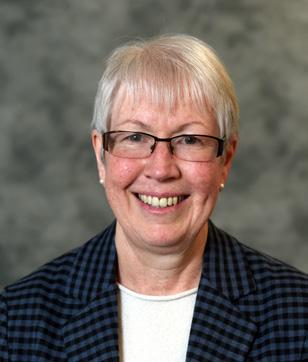
The Institute of Health and Wellbeing officially launched on 30 March opened by Lord Stevenson. The afternoon was very well attended with over 60 delegates from a range of organisations across Suffolk.
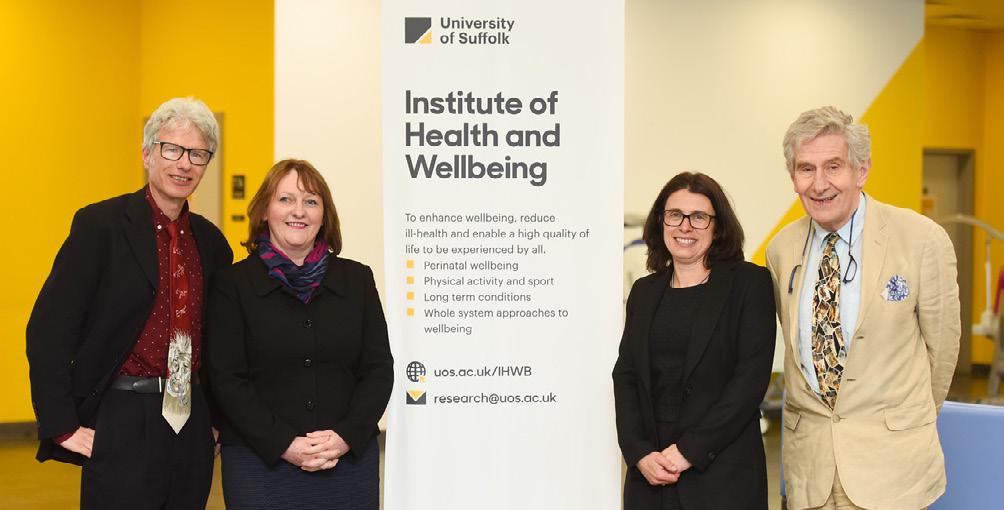
Attendees learnt about the four research themes of the Institute: Perinatal Wellbeing led by Professor Colin R. Martin; Physical Activity and Sport led by Dr Marco Beato; Whole System Approaches to Wellbeing led by Prof Valerie Gladwell; Long term Conditions led by Dr Noreen Cushen Brewster. Members of staff also showcased some of their current work. It will be exciting to go with the energy that was created during the launch and develop the relationships with the organisations that were present. Our Digital Design students here at the University kindly filmed the day and are creating a short montage video, which will be available on our website shortly.
Both Professors Martin and Gladwell presented their work in their inaugural lectures in March. It was great to see such good attendance at these face to face lectures.
On 18 May Dr’s Marco Beato and Mark Connor organised a well attended sport science symposium, with excellent feedback from those
in attendance including students, academics, and practitioners.
We have had several papers published including Professor Colin R. Martin, who recently completed a study in the Czech Republic looking at birth experience and the impact of the birth delivery method on birth experience in 465 Czech speaking mothers. The reference for the research paper is: Kateřina Ratislavová, Eva Hendrych Lorenzová, Caroline J. Hollins Martin & Colin R. Martin (2022) Translation and validation of the Czech Republic version of the Birth Satisfaction Scale-Revised (BSS-R), Journal of Reproductive and Infant Psychology, DOI: 10.1080/02646838.2022.2067837.
We have been very successful with various funding applications with a range of projects for example evaluating the North East Essex Diabetes Service, exploring Continuity of Care for childbirth, and developing a Sleep Satisfaction Scale.
Prof Gladwell has just completed evaluation work for the Centre for Sustainable Health for their Green Space for Health project.
To find out more about our work please visit our website.
Pictured left to right: Professor Colin Martin, Clinical Director of the Institute of Health and Wellbeing, Noreen Cushen Brewster, Associate Professor in Workforce Futures, Professor Valerie Gladwell, Director of the Institute of Health and Wellbeing and Lord Stevenson of Coddenham CBE, Patron of Suffolk Mind.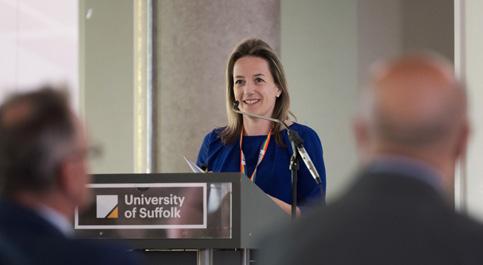
An initiative led by Senior Law Lecturer Eleanor Scarlett to provide students with an opportunity of advising members of the public on specific areas of law culminating in the launch of the University of Suffolk Legal Advice Centre on 18 May 2022. Together with Director Eleanor Scarlett, Dr Stephen Colman and Ant Wooding, 14 student volunteer began planning for the Legal Advice Centre in November last year as part of a steering group set up to establish the principles of the Centre including the areas of advice in which it would operate.
Students, under the supervision of staff and external solicitor volunteers, met with their first clients in February 2022 during a ‘soft launch’. In the successful soft launch, students received 22 enquiries and produced 12 detailed letters of advice.
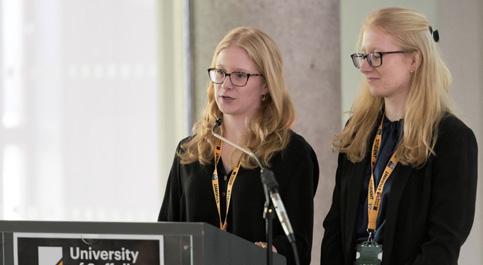
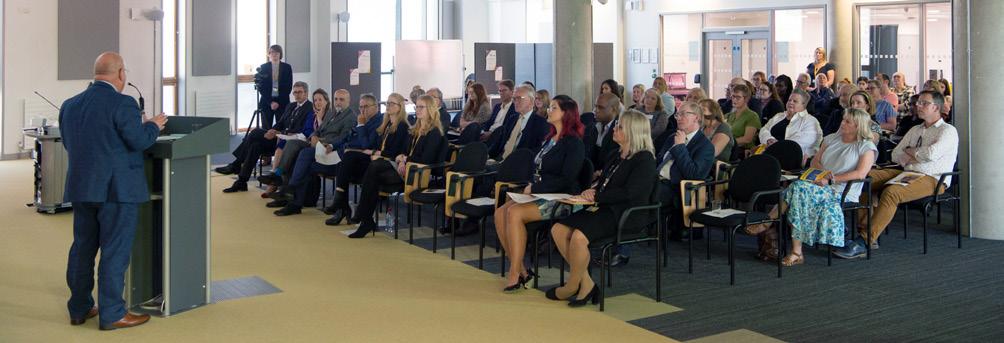
In addition to providing law students with an opportunity of putting what they learn into practice, the Legal Advice Centre is based on a commitment to provide support and benefit to the local community with advice around two key areas, family law and business law:
Solicitor of the Year 2022 at the Birmingham Law Society awards.

A ground breaking new partnership has been After they developed plans in 2020 for the former Palmers department store, Great Yarmouth Borough Council bought the building in 2021 and began to develop a new University Centre and community hub. The University formally committed to the scheme with a £3.5m contribution, working closely with East Coast College who will teach degree level courses at the new centre, accredited by the University. This latest commitment from the University brings the funding secured up to £15.3m and work can now begin to prepare the five storey, 5,300 square metre building for its new role. Norfolk County Council has committed £2m towards the new centre creating a new local library and a base for the county’s award winning adult learning service.
Carl Smith, Council Leader, said, ‘This investment in education and learning is part of our drive to help resident employability and the borough’s economy,” Norfolk County Council is contributing £2m and around £7.5m comes
from Great Yarmouth’s government Town Deal programme and £2.4m from the Future High Streets Fund. Work can now begin, and students and the public are expected to use the space within a year.

East Coast College Chief Executive Stuart Rimmer said, “We are delighted to be extending our partnership with the University to include the new learning hub. This will enable us to offer courses in growth industries such as health, engineering, and the digital arts in fantastic new facilities right in the heart of Great Yarmouth, revitalising the town centre and bringing new skills and opportunities to people of all ages.”
University of Suffolk Vice Chancellor, Professor Helen Langton said: “As a community impact and civic university committed to widening access, creating a learning, training, and apprenticeship hub in Great Yarmouth covering key areas such as health, technology, and engineering, is an excellent opportunity to help create the skills required for Great Yarmouth’s rapid development.”
A ground breaking new partnership has been formed to further strengthen educational and training opportunities in Great Yarmouth and Lowestoft. East Coast College, James Paget University Hospital and the University of Suffolk have signed a Partnership Agreement developing projects and creating new opportunities to help local people access training and highly skilled jobs. The unique partnership will open up a range of opportunities from Level 2 job roles to local nursing degree study and include the immediate creation of 24 hospital placements for students studying the new T Level Health course at East Coast College from September. This will support students to adapt to change, meeting the emerging needs of the healthcare workforce and directly lead to places on nursing and clinical degrees. In addition, opportunities will be developed for Level 2 Health pathway students to visit a range of areas within the hospital including pharmaceuticals, screening departments, dieticians, and digital health, and for University of Suffolk foundation degree and honours degree students to complete six week block placements on the children’s ward and oncology department.
The Partnership Agreement also signals the continuation of the transition programme, Project Search, now in its 10th year, enabling East Coast
Pictured: Holly Chase, Assistant Principal for Health Studies at East Coast College, Julia Bates, Deputy Principal Curriculum and Strategic Partnerships at East Coast College, Mohammad Dastbaz, Deputy Vice Chancellor of University of Suffolk, Stuart Rimmer, Chief Executive of East Coast College and Jo Segasby, Chief Executive of the James Paget University Hospitals NHS Foundation Trust.
Photo credit: East Coast College
College students to develop skills and experience working at the hospital in Gorleston, alongside the ongoing delivery of Level 3 Business Administrator Apprenticeships at the hospital. Stuart Rimmer, CEO and Principal of East Coast College, said: “This innovative strategic partnership agreement is focused on delivering change in our region, helping people access the high skilled jobs we need. Together we will help retrain and upskill existing staff and help support young people to start a career with the NHS. It’s very exciting.”
Jo Segasby, Chief Executive of the James Paget University Hospital NHS Foundation Trust, said: “I am delighted that the James Paget has further strengthened its partnership with both East Coast College and the University of Suffolk to establish local educational and training opportunities. As the Paget celebrates its 40 th anniversary this year, this demonstrates our commitment to nurturing skills and expertise, and to ensure local health and care services meet future needs.”
The University of Suffolk Vice Chancellor, Professor Helen Langton, said: “With over 1400 students in health related subject areas and a thriving portfolio of undergraduate and postgraduate courses, we are delighted that this collaborative partnership will further develop health and nursing provision.”
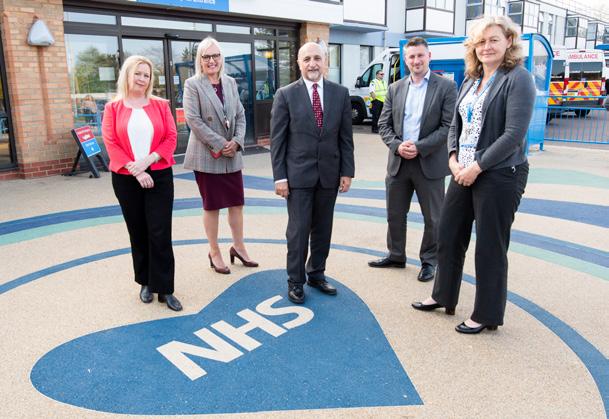

Our research has been recognised as both world leading and internationally excellent in the recent results from REF 2021. As a university we are extremely proud to have made our first submission to the Research Excellence Framework (REF) in 2021 and to have received a brilliant outcome. Nearly 70% of our research outputs were rated as either 4* (world leading) or 3* (internationally excellent) quality which includes our research impact.
REF evaluates both the quality and impact of research at UK universities to provide an independent confirmation of the strength of a university’s research, and how it makes a real difference nationally and internationally. This outcome is a tremendous achievement for our university and will be transformational in developing our future research agenda.
Our REF 2021 submission was in one Unit of Assessment, Social Work and Social Policy (UoA 20). Our research strategy is vital to our university, to help us build a research enriched environment, and we have already started to deliver our ambitious plans developing our research culture and our next REF submission.
Since our submission for REF 2021 we have invested over £1M in our research agenda with new professorial appointments and establishing our research institutes with dedicated additional research expertise. We have also attracted £3.5M of external research funding; produced 174 new excellent research outputs and invested more than £150,000 on research training and development.
Professor Helen Langton, Vice Chancellor of the University of Suffolk said: “We are delighted with the outcome of REF 2021. These excellent results evidence the University’s efforts to deliver on its vision of transforming lives locally, nationally and globally. The impact of our research is vital to our success in meeting that goal and provides significant assurance of our future position as an internationally recognised, high quality
research institution. The Board and I would like to personally thank all colleagues involved for this significant achievement.”
Professor Emma Bond, Pro Vice Chancellor of Research at the University of Suffolk said: “I am delighted that our research has received such recognition from the panel. The excellent outcome of our first REF submission is evidence of the rapidly growing research culture and the high quality research being undertaken by the University.

“We have already started working on our next REF strategy, identified eight potential Units of Assessment and have increased our number of staff with responsibility for research by 50%.”
If you are interested in finding out more about REF and our research, please do get in touch: researchoffice@uos.ac.uk
As the Smart House, constructed at Adastral Park, nears completion, plans are being made for its launch and use. The design process has been celebrated in an article written by University of Suffolk lecturer, Ben Powell, for the RIBA Journal describing the student hackathon process and the building’s low embodied carbon footprint. Further work in the embodied carbon analysis will be undertaken by Dr Alison Pooley, Research Fellow at the University’s Suffolk Sustainability Institute in conjunction with the Centre for Alternative Technology. A mini building is also being erected adjacent to the house to showcase hemp as an alternative building material.
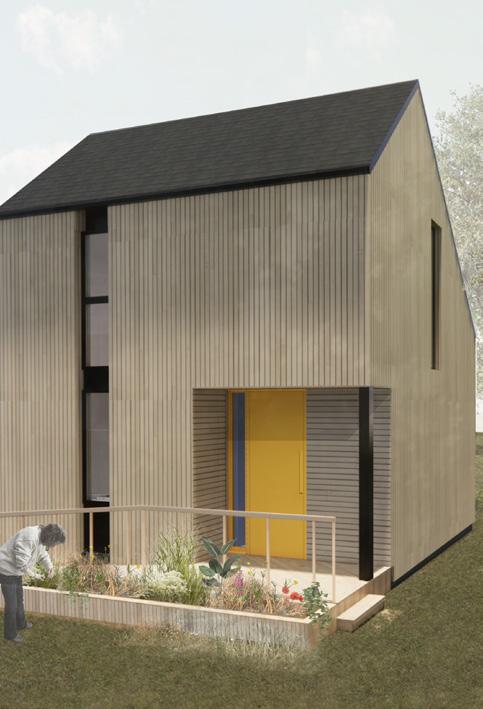
Meanwhile, the ‘smart’ side of the Smart House is being explored in design workshops with the University Research Fellow, Dr Hannah
Steventon and experts from BT Applied Research: a range of internal communications technologies will be trialled, hosting sensors to capture environmental and activity parameters, supported by dedicated data management protocols and facilities.
The research and use strategy for the Smart House includes research on the fabric of the house, research sited in and around the house, a facility for student dissertation research, and use as an educational and commercial showcase and demonstrator. Planned projects include important research on the health impacts of garden fire pits, and experience of the house during short residential stays.
Anyone interested in visiting or using the house should contact Dr Hannah Steventon, h.steventon@uos.ac.uk.
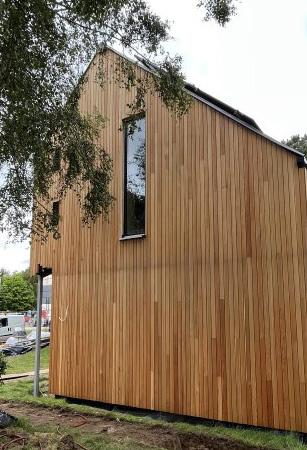
Vice Chancellor, Professor Helen Langton, is named as one of the county’s most influential people in the latest Suffolk 100 list. The list is compiled by media company Archant and showcases influential leaders helping to shape the future of Suffolk and celebrates those who significantly contribute to county life. Public nominations are put before a judging panel who draw up the final list — the first since 2017.

Paying tribute to the whole University team, Helen said, “I am honoured to be nominated as one of the 100 in Suffolk. This is one for the whole team at the University of Suffolk. Well done team. I could not do this without you all.”
Others in the list include our honorary graduate, Ed Sheeran, Lady Clare Euston, Lord Lieutenant of Suffolk and Christine Abraham from Community Action Suffolk.

Two events happening at the University as part of our programme for the Festival of Suffolk will focus on careers and on mental health.
Students from schools and colleges across Suffolk will be invited to join us on this interactive and engaging day to find out about the wide range of careers that are available at a university, that aren’t just about teaching!
From working in the virtual radiotherapy suites, to improving your local community through research, this day will explore the wide range of opportunities available.
We will also be running our first Impact Challenge Lab in conjunction with Suffolk Mind, with a focus on improving mental health.
Brad Jones, editor of the East Anglian Daily Times, said: “The list recognises the people who do so much to shape the county and drive it forward.”
The Challenge Lab will include two interactive morning workshops, and the invited guests will have the opportunity to take part in both sessions.
The University of Suffolk is celebrating after climbing 26 places in the latest national league table, on the back of finishing in the Top 10 in two categories in this year’s Whatuni Student Choice Awards.
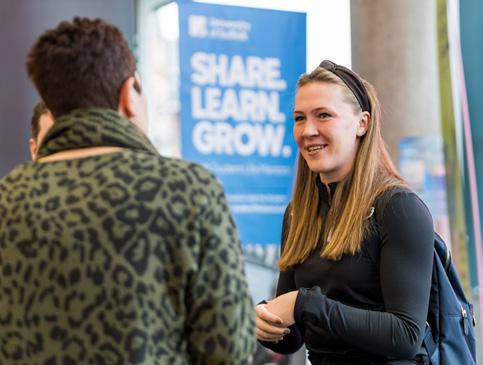
The Complete University Guide 2023 has the University as the third highest climber in the country which follows a rise of 30 places in another table, The Guardian University Guide last year.
The Whatuni Student Choice Awards are collated from over 30,000 real student reviews collected from campuses around the UK and from students using the Whatuni website.
In the Lectures and Teaching Quality category, the University came tenth, up from 31st place two years ago when the awards were last held in person.
Also ranking tenth this year in the Facilities category, the University was up from 56th place two years ago.
Professor Helen Langton, Vice Chancellor, described the Whatuni results as a “brilliant achievement” saying, “It was extremely pleasing to see the University of Suffolk students supporting us to be nominated at the Whatuni awards for learning and teaching and facilities. It was even more pleasing to see that in both categories we have climbed up the rankings.
This demonstrates our ongoing commitment to providing an excellent student experience, ensuring that our students benefit from high quality learning and teaching within world class facilities.”
The Complete University Guide is based on ten measures including entry standards, student satisfaction, research quality, graduate prospects, spending on academic services and spending on student facilities.
Commenting on the Complete University Guide ranking, Professor Langton said: “The University of Suffolk is delighted with the enhancement in our league table position.
“This reflects our hard work and focus on the experience of our students. It also demonstrates the quality of our provision as a young and ambitious higher education institution.
We are heading in the right direction and league table positions such as this one cement this. We are extremely pleased.”
The University of Suffolk held its first International Festival to celebrate our international community, funded through the Student Experience Fund.
The first day of the festival was aimed at students, giving them the chance to learn about opportunities to study and work abroad and create their own flag in a drop in session with local craft company Rock Paper Scissors.
Carolina Porquer Pomar, an international student from Spain and member of the University Dance Society, said, “The international festival was interactive and inclusive. I really enjoyed the fact that you could make and colour your own flag, and it is really interesting to meet new people and see where other international students at the University come from. The Dance Society
enjoyed participating in this festival, helping to share a sense of community and knowledge of dances around the world.
The second day of the Festival was the staff day, where staff could find out about opportunities to work abroad, learn more about the International Staff Network and tuck into an international buffet.
Student Life Adviser Emily Mason described the event as “a great success”, with members of the International team engaging with staff and students from a variety of countries and helping to raise awareness of the numerous support programmes available.
Emily added: “We hope that this event will become an annual event and will continue to grow.”
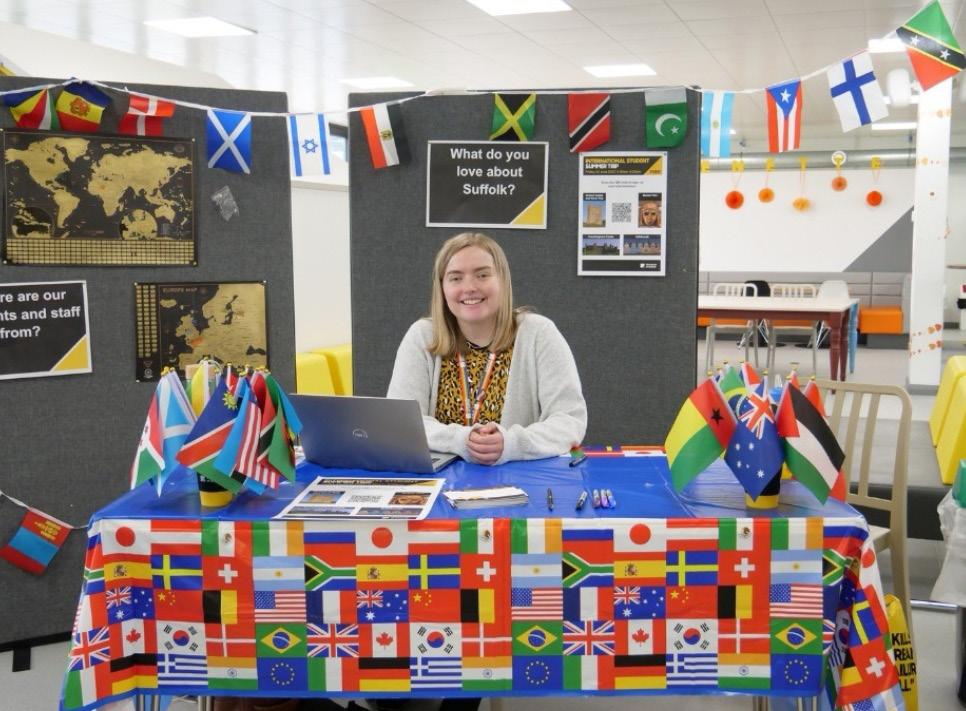
This year we see a welcome return of the End of Year Show for Arts courses within the School of EAST.
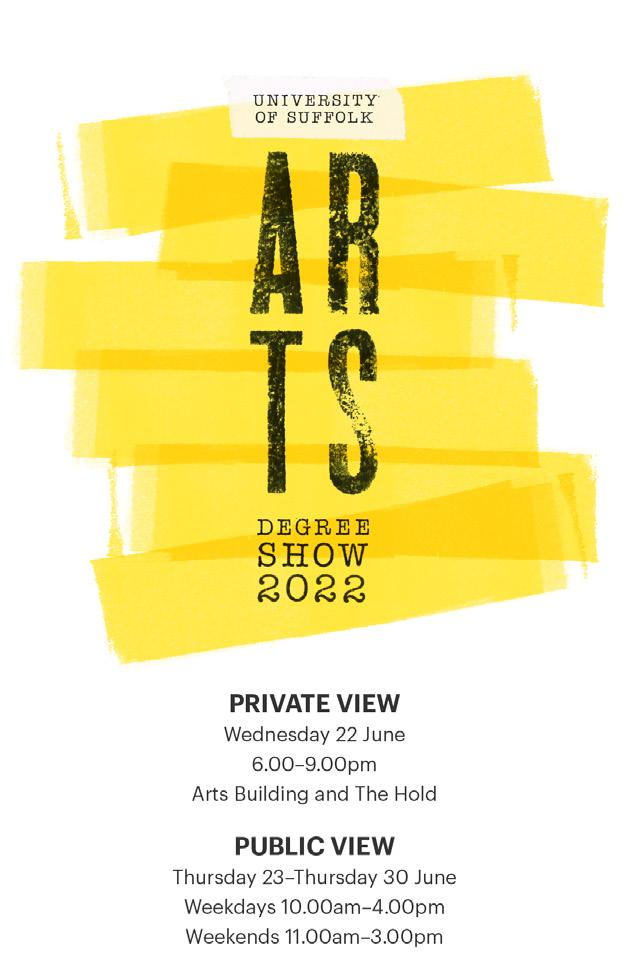
Final year students from Digital Film Production, Fine Art, Graphic Design, Graphic Illustration, and Photography will be turning the Arts Building into a gallery to showcase their work, while Architecture students will be displaying theirs in The Hold.
The tradition of hosting a graduate show at Suffolk, alongside other art schools up and down the country, dates back over 25 years, with students,
family, friends and industry guests eagerly anticipating this annual event.
With the pandemic preventing shows in 2020 and 2021, we expect there to be a buzz about the End of Year Show’s return this year, so if you missed the opening night, take a look later as the show will
The art show logo was designed for this year’s show by one of our own students, Correy Abbott, and features individual hand stamped letters and hand rolled graphics. Graduating in 2018, she now works for our in house design team producing work for all University departments.
In his 7 July lecture “One Planet Living – Playing Jenga With Nature”, Professor Darryl Newport will ask if we are truly aware of the dangers we face if we continue down our current unsustainable path.
Prof Newport will also discuss how continuous extraction of the world’s limited resources and heavy carbon industry will have a catastrophic effect on biodiversity and the future of humanity.
Unsustainable exploitation of
the natural world threatens food and water security for billions of people and affluence has continuously increased resource use and pollutant emissions far more rapidly than they are being reduced.
There is a clear need to look at decarbonising material extraction and use while moving towards a fully net zero economy.
Prof Newport (Professor of Energy and Sustainable Development)
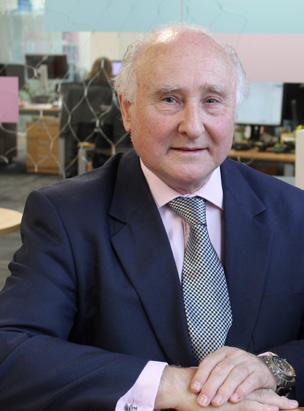
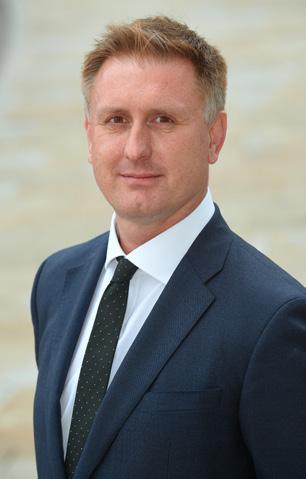
is the Director of the Suffolk Sustainability Institute at the University of Suffolk.
He has a wide research interest in areas including infrastructure, resource management and the built environment.
The 7 July, 6.00–8.00pm, lecture is in the Waterfront Building, places can be booked by following this link: One Planet Living — Playing Jenga with Nature
On 5 May, Dr Ed Garratt, Chief Executive designate of the Suffolk and North East Essex ICS, shared his reflections on leading the NHS locally. In particular he explored the importance of creating a sense of belonging, building new partnerships and his commitment to collaboration over competition. Ed is a visiting Professor of Integrated Care at the University.
Dr Ed Garratt is Accountable Officer for Ipswich and East Suffolk, West Suffolk and North East Essex Clinical Commissioning Groups, the Executive Lead for the Suffolk and North East Essex Integrated Care System (ICS) and the lead
David Croisdale Appleby is involved with social policy and healthcare policy on both the national and international stages, and in his lecture on the 7 April he shared with the audience his personal view of the future shape of healthcare if we are successfully to address the health deficits in our population and the growing health inequalities amongst our citizens.
David has throughout his life worked to improve the lives and life chances of disadvantaged, oppressed and vulnerable people, chairing many public sector
commissioner of the East of England Ambulance NHS Trust.
With a strong reputation for building collaboration, Ed has over 20 years’ experience of working in the NHS, working at a regional level in commissioning and currently co chairs the East of England Health Inequalities Board. He has worked on major national policy by supporting the development of the NHS Constitution and the Government’s NHS White Paper 2021. Ed holds a doctorate in English Literature from the University of Cambridge.
organisations in medicine, health and social care, social work, and criminal and civil justice. At the request of government, he wrote an independent review of social work education and created a programme of public lectures on the new Integrated Care Systems.
David currently chairs the Royal College of Physicians, the world’s leading Medical Royal College, Dementia UK, Beyond Autism, and the Public Health and the Social Care Advisory Committees at NICE, and serves many other national and international organisations.
The ability to have access to green spaces and naturalised landscapes within an urban environment has never had greater emphasis; informed as it is by our experiences during lock down, coupled with an increased understanding of nature’s relationship to physical and mental health and growing concerns over dwindling biodiversity. All factors that have served to accelerate research into nature based public health policy, master planning and building design across the UK within the last few years. Research output is both quantitative and qualitative. For example, a 2019 epidemiological study into human health in urban environments considered levels of health across Sheffield wards by mapping them against landscape metrics1. The results demonstrate that residential areas with access, or visual proximity to water and trees have a clear association with better health outcomes, whereas areas with only open amenity grass land have higher levels of poor health. Whilst the physical biomarkers used in this research support the value to health of green urban spaces, they also highlight the importance of greater biodiversity and more naturalised planted habitat species within those spaces.
The impacts of nature poverty on urbanised environments present health and wellbeing implications not only for residential inhabitants, but also the workforce. It therefore makes good sense to focus on nature and biodiversity in the design and planning of our University estate.
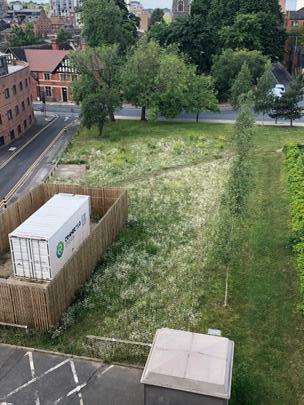
Since 2019 our current Biodiversity Plan and its corresponding implementation programmes have sought to improve outcomes for nature, whilst simultaneously re connecting our staff and students to it. Brickmakers Wood, our wildflower meadow,
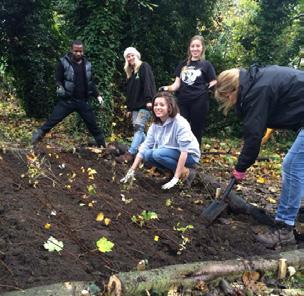
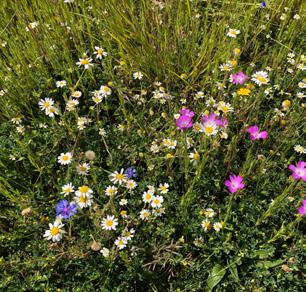
wildlife garden, green roofs, to name a few initiatives, and our recently envisaged Health and Wellbeing Building physic planting scheme, alongside the planned campus allotment create an emerging campus that is working toward placing accessible natural spaces at its heart.
The intentional and exemplary design of biodiverse natural spaces is clearly as crucial as that of our buildings for ensuring great student experience and retention. This spring the Association of University Directors of Estates (AUDE), published their Campus Spaces and Places: Impact on Student Review of Evidence report. The report collates insights from highly evidenced surveys into the potential impact that the design and use of campus spaces and places can have on student outcomes. It identifies the importance of social spaces. With 29 studies focusing on quality of life examining student outcomes at a campus wide level,the findings of these studies suggested that the physical architecture of a campus is much less important to students once they are settled, than the provision of, and access to, green, natural spaces.
Our estates ambition therefore, is to consider all our liminal spaces, those external corridors that our community passes through between locations, and work towards making them destination spaces within themselves. Creating places of activity that engender community and belonging, places of the senses, such as our sense of ourselves, our balance and equilibrium with the natural world and developing places for people of all abilities, mobilities and neurodiversities to allow us to experience nature during our time at the University.
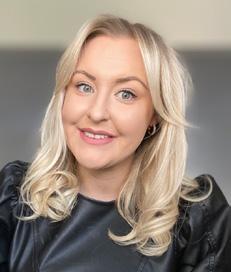
Tell us about your role?
I joined the University five years ago doing phone, face to face and email IT support, which went on to become the current drop in system. I also studied for my degree while I was working and it was good to know and see the organisation from both sides, as an employee and a student. I graduated in my third year in post and moved into the service desk role which was more about liaising with departments and managers.
What are the standout characteristics of your work.
Right from the start, I was struck by the positive team culture and the focus on providing a great service. We learn the tech side, but excellent customer service is a priority. It was a privilege to progress to manage the team and recruit two new staff. We demonstrated and shared the ‘can do’ attitude at the heart of our work, and are genuinely a diverse group of people, challenging perceptions about typical IT support staff.
Six months ago, a project coordinator opportunity became available, combining the people skills and my understanding of IT requirements with the added strategic dimension. The project office is a new initiative with over 50 projects across the whole University estate. Project management as a concept is common within the corporate world and the new office demonstrates the University’s commitment to embracing innovative practices and facilitating change. All projects have an IT element, our job is to look at the requirements, align them with our strategy and manage expectations and delivery. The core characteristics are the same; I’m still providing a service, just on a bigger scale.
What does an average day
A lot of meeting different departments to understand project objectives and the requirements that must be met within a timetable and budgets, etc. We align projects to the University’s goals and then identify an appropriate pathway to ensure delivery within budget and timeline, and the department or directorate expectations. It is exciting because as a relatively young university we are developing rapidly, and IT is central to every project initiative.
What opportunities do you think the experience of the last 18months has opened up?
The pandemic demonstrated that we could support our users remotely and explore working differently. By now everyone is familiar with agile working, that was a project delivered by Estates, POD and our
project office ensuring all the IT is place. This was a pilot project with a level of advance consultation, but we continue to receive and welcome feedback to ensure the changes develop and improve; like IT support, this is still about customer service.
Since January I have been leading on the planning for the implementation of a new service desk ticketing system, and this is being consulted on and tested within a number departments to get initial thoughts. We view this as a collaborative process, we are inviting all staff and students on the journey with us to implement the changes, feeding into the process to ensure that it is fit for purpose and bringing positive change to how our users interact with us to resolve their problems and requests. I often find myself drawing on my experience as a staff member, IT specialist and student learner to ensure developments work from all perspectives.
What surprises you most about your area of work?
People commonly perceive utilities and water as fundamentals of life, they are only slowly beginning to understand that IT sits alongside these, reaching into every aspect of how people live their lives, order their food, access entertainment, etc., it isn’t an option it is integral.
What is the best bit about your work?
Moving into project management, you get the people side of it, face to face, combined with the tech delivery process so it is an extension of IT customer service but affecting whole groups of people, departments and schemes. The change element is exciting, improving and using my knowledge to support the University to continue to drive innovation and technological change, that is so essential for maintaining our place in a competitive market.
If you could sum up the University in a sentence what would it be?
One hundred percent it is the people and the culture, it is a community with a family culture made up of really supportive teams. We use some really clear messages about our organisation, and it is all true, new staff all talk about how warm and friendly they find it, everyone genuinely feels that they can say and challenge anything, that is a great message about our culture.
A tribute to grandparents and a love of East Anglia have combined to win a University of Suffolk student a prestigious writing award.
James Brown, who is halfway through an MA in Creative and Critical Writing drew on his love for his late grandparents and his affection for the area to write In The Blood and win the Student New Angle Prize (SNAP).
The competition is run in conjunction with the New Angle Prize for Literature and asks for writing which offers a sense of East Anglia, evoking its spirit and identity.
James, who grew up in Stowmarket, was close to his grandparents and wrote his winning piece as a tribute to them.
Talking about the story he said, “When I think of the area, I think of family. I was very close to my grandparents. Their influence and passing affected and shaped me in immeasurable ways. It’s a very personal piece that I hope captures the elements that make these kind of relationships transcendent and magical.
I’ve been humbled at every stage, from being listed to winning. The competition was so strong. I know several of the other entrants and all are amazing writers.”
Judging the entries was award winning writer, Zoe Gilbert who is a visiting Fellow for Creative Writing at the University of Suffolk. She described James’s entry as ‘a seemingly quiet story that packs an emotional punch’.
Praising the standard of entries, Zoe added: “Reading these stories together was a particular pleasure, birds, water and Suffolk sights and voices echoing between them.
“They felt like six siblings each with their own unique view of a shared world and I came away with so many strong images of both town and country, people and landscape, but all imbued with deep feeling. I enjoyed them so much that it was a personal agony to have to choose, and I hope that all six will be enjoyed by readers far and wide.”
Amanda Hodgkinson, Senior Lecturer in English and Creative Writing, said: “The competition is a great opportunity for all students to embrace their creativity and celebrate our region. With professional judges and its affiliation with a major literature prize, the SNAP competition is an example of our belief in a university community, in offering opportunity and in the University as a hub for a Creative Suffolk.”
Photo shows entrants and senior lecturers (clockwise from bottom left) Jeremy Evans, Caroline Roberts, Dr Antonella Castelvedere (Senior Lecturer), Dr Amanda Hodgkinson (Senior Lecturer) James Brown (winner) and Sophie Wilk.
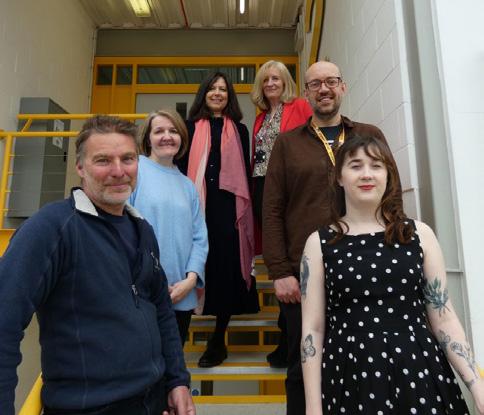
A conference hosted by the University’s Institute for Social Justice and Crime. Join us for this one day conference on Friday 15 July, with leading experts from both the Violence Against Women and Girls (VAWG) sector and beyond.

Organised by Dr Dev R Maitra of the Institute of Social Justice and Crime, the conference will bring together a wide range of practitioners, activists, academics and scholars to discuss the topic of violence against women and girls in contemporary society.
There has been increased attention, both in the UK and globally, in the rights of women and girls and the vicissitudes faced by them in daily life. This has been particularly amplified through cases such as the murder of Sarah Everard in the UK, the heightened levels of domestic abuse during lockdown, and the murder of Dr Lorena Quaranta at the start of the global pandemic in Sicily, Italy, in March 2020. Increased academic and public attention has not, however, always led to legislative change, and problems still remain
entrenched and manifold, ranging from street level sexual harassment, femicide and discrimination.
The keynote speakers are Maya Tutton ‘On Tackling Public Sexual Harassment ’ and Dexter Dias QC ‘Public Sexual Harassment ’. There will also be presentations from Dr Dev Maitra ‘Femicide, Lockdown & DV Responses’, Dr Paul Andell ‘Girls in county lines trafficking. A case study ’, Colin Boyd ‘Violence, sexual exploitation, and trafficking: the troubling trajectory of some homeless women and girls’ and a panel discussion ‘VAWG: From Theory to Practice’, the panel is comprised of Dr Dev Maitra, Dr Katherine Allen, Dr Joana Ferreira.
There will also be plenty of time for, questions, discussions and networking
Please join us for this free, fully catered one day conference which will bring together leading experts in the field, from both the VAWG sector and beyond. Tickets available from eventbrite.
The event will run from 9.30am to 4.45pm.
24–26 August 2022
Dr Tom Vine
Suffolk Business School
Suffolk Business School is proud to announce that it will be hosting the 15th Annual Ethnography Symposium, in August.
In collaboration with the Journal of Organizational Ethnography and the Universities of Manchester and Liverpool, we look forward to welcoming delegates from across the world. Our confirmed keynote speakers are Professor Melissa S. Fisher (Cultural Anthropologist, New York University Institute for Public Knowledge), Dr. Ciara Kierans (Reader in Medical Anthropology, University of Liverpool), and Professor Charlotte O’Brien (Socio legal ethnographer, York Law School).
See full details
Keep an eye out for a special visitor flying in and landing near our question mark outside the Waterfront Building as part of this year’s St Elizabeth Hospice Big Hoot Trail.
The University of Suffolk is a sponsor of one of the sculptures and “Tropical Vibes” by Debenham artist Lily Hammond will be on display from 19 June to 3 September.
For more information about the trail go to The Big Hoot Art Trail - The Big Hoot Ipswich 2022
